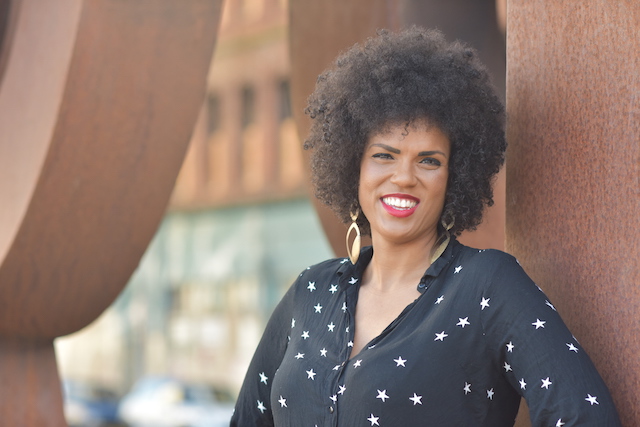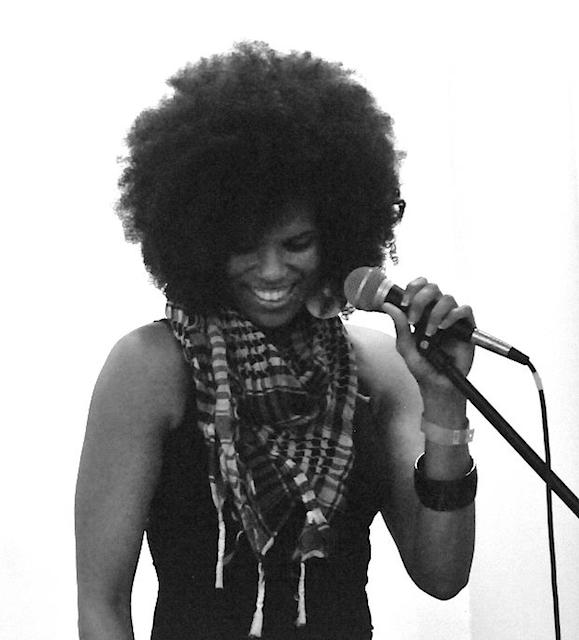
Story and photos by Pete Shaw
One of the last events I was able to cover prior to the onset of the novel coronavirus was of my Friend Walidah Imarisha speaking at the University of Portland’s inaugural MLK Day On event, on January 20, 2020. After a year and change of masks, social distancing, lockdowns, and all other manner of coping with life during the pandemic, that day seems so far away. I had not seen her for an all too long spell prior to her talk, and as my better 99% and I approached her, I was fumbling in my mind with the words to apologize for my absence. Those worries were quickly rendered obsolete as she greeted us with her radiant smile and a warm embrace.
Soon, we were all down to business. She gave her talk, an informative variant of her Why Aren’t There More Black People in Oregon? presentation that was tailored to the occasion. I took notes and snapped some shoddy photographs. And my better 99% kept an eye on me–never a small feat–and more importantly, afterward, discussed Imarisha’s presentation with me.
Now over a year later, there seems at least some light at the end of this fetid Covid-19 tunnel. People are getting vaccinated, and indeed, I received my second dose of the Pfizer vaccine two weekends ago.
And so it only made sense that my first baby steps back into the world involved Imarisha. On Friday March 5, she gave an online reading of portions of her excellent 2016 book Angels With Dirty Faces, a work that explores the US injustice system. Through its pages, Imarisha makes an eloquently forceful argument for the abolition of this country’s police and prison systems that not only dehumanize those thrown into it, but as well, the rest of us whose lives seemingly continue unabated.
The US government often talks about its commitment to freedom, and of course, there is the near daily mantra that this is one nation, under god, indivisible, with liberty and justice for all. It’s propaganda and it’s nonsense, but it is effective propaganda, and thus it is nonsense that often goes unquestioned. This putatively maximally free nation holds 25% of the world’s prisoners in a gulag system whose roots, along with the police that help funnel people into it, go back to the antebellum slave patrols. As Imarisha noted, “Prisons and police keep us all less safe. They are fundamentally about controlling potentially rebellious groups.”
In the second section of Angels with Dirty Faces, Imarisha writes of her introduction to politics, one of the pivotal moments of her life. Not the electoral type of politics, but the on-the-ground, grassroots, gritty stuff that is the true foundation of any movement toward true liberation. She was pushed toward that path by Mrs. Borrevick, a guidance counselor at her high school in Springfield, Oregon, who suggested instead of pursuing the life of a historian (Imarisha contemplated pursuing an internship at a “pitifully small local museum”) surrounded by “dusty memorabilia from the pioneer days,” she head on over to the office of an organization named Clergy and Laity Concerned.
Although worried Borrevick was recruiting her for a Christian youth group, she took a couple of buses to a neighborhood those living outside of it considered sketchy. As she writes, she was “too young politically to know ‘bad’ and ‘unsafe’ parts of town meant ‘brown.’” At this organization’s office she was introduced to a new world with new words as well as older ones that were suddenly given new meaning. It was far from the Advanced Placement US History class she had dropped after the first session. Communism, socialism, Zapatistas, Sandinistas, Assata Shakur, apartheid, and the Black Panther Party “all swirled around” her.

“I didn’t know what the hell these people were talking about. But I was beginning to get the feeling there was a whole world out there that I knew absolutely nothing about. I was damn sure going to find out, though.”
On the page, those words are forceful enough, a young person glimpsing a possible, never before noticed future out ahead of her like a thundercloud. But hearing Imarisha say those words, imbuing them with the time and experiences since she was stirred, was a reminder in this time of isolation of the power of book readings, of an author bestowing upon audience not just words, but rhythm, dynamic, and cadence, and the beauty and Wisdom they carry.
From this newly revealed stepping stone, Imarisha soon finds herself attending a rally in support of Mumia Abul-Jamal, the journalist and political prisoner serving time from trumped up charges of murdering a policeman who became her “North Star.” In doing so, she finds her political home and community from which over the ensuing years she has learned so much, and in turn, to which she has given so much.
In many ways, Imarisha embodies the epitome of a curious mind, one of startling breadth. She not only writes sparkling prose, but she is a gifted poet, a highly regarded composer of science fiction stories, and I would not be surprised to find she bakes 15 minute brownies in twelve. But her most glorious attribute, which stems from her innate curiosity, is her capacity for seeing the humanity in all people and for working to rid this world of the systems and institutions that seem built to destroy that humanity.
In Angels with Dirty Faces, we meet two prisoners who cross that path which began at Clergy and Laity Concerned. One is her adopted brother Kakamia, who was given a sentence of 15 years to life for conspiracy to commit murder. At the time of the book’s publication, he had spent almost 30 years in prison. Kakamia introduced Imarisha to Jimmy “Mac” McElroy, a former hitman for the Westies, a vicious Irish gang out of Hell’s Kitchen, Manhattan, New York. Through Imarisha, we do not just meet two criminals who have committed grave acts who must be kept behind bars because they are capable only of committing more heinous crimes. We meet people, flawed, admittedly to greater depths than many of us, but nonetheless humans, full of complexity and like any of us, capable of also committing acts of great thoughtfulness and beauty. But as Imarisha notes, they are guilty of crimes that when committed by others–for example, dropping bombs on Iraqi children–are given other names. Murder, depending on its guise, so easily becomes patriotic duty, freedom, and democracy.
One of the most important insights I have taken from Imarisha’s work regarding police and prison abolition is the difference between crime and harm, two very different things. Following her reading, Imarisha expounded upon the distinction. Crime is a political designation, one that changes with time. Harm, however, is consistent. A hurt is a hurt is a hurt, and if harm is not addressed, both in terms of how it affects individuals and communities, then it will fester, an open wound never allowed to heal. As Imarisha noted, prisons only serve to harm. And as their foundational purpose is to control potentially rebellious groups, they will never heal individuals and communities.
“They can’t be fixed,” said Imarisha, “because they are not broken.”
Imarisha’s voice, along with many other voices and indomitable spirits over the years, has had influence and borne fruit. The past few years have seen the movements for police and prison abolition gain more steam and become part of the mainstream conversation. Last Summer’s uprisings surrounding the movement for Black lives, the result of many years of sustained, hard work, put these issues at the forefront for all to see.
Closer to home, since Angels with Dirty Faces was published, Kakamia has been released from prison. He now works as an artist.
And Imarisha was recently named an Assistant Professor in the Black Studies Department at Portland State University, and is now the director of the school’s Center for Black Studies. Her work toward a more just world will continue there, educating future generations. We are all better for it.
Walidah Imarisha’s Angels with Dirty Faces is available from AK Press at: https://www.akpress.org/angelswithdirtyfaces.html






